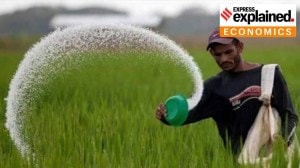India and China agree to resume defence exchanges
<b>BRICS</b> * Major General-ranked officer to lead Indian delegation on regular visa.
India and China today agreed to resume high-level defence exchanges with Beijing giving its consent to let a division commander,a Major General-ranked officer, from the Northern Army Command to lead a military delegation to China later this year. The understanding is that this officer will be given a proper visa,not a stapled one.
This effectively ends the year-long Indian suspension of high-level military exchanges with China after it conveyed last year that the Northern Army Commander,who was to lead a multi-command delegation to China,would require a stapled visa. This was based on the reasoning that China provides stapled visas to residents of the area,Jammu & Kashmir,which fall under the command of the Northern Army Commander.
As reported first by The Indian Express,the compromise was reached after India conveyed that instead of the Northern Army Commander,this delegation would be led by a Major General from the Northern Command and would include representatives from other military commands as well.
In fact,sources said,the delegation size would be of eight to nine members with more officers from the Northern Command besides the leader and all of them would get proper visas.
This significant breakthrough was firmed up at the bilateral meeting between Prime Minister Manmohan Singh and Chinese President Hu Jintao on the margins of the BRICS (Brazil,Russia,India,China and South Africa) Summit here.
Given that a division commander is in charge of only a part of the area under Northern Command,sources said,was an argument that helped resolve the deadlock.
According to National Security Advisor Shivshankar Menon,the two leaders also took forward the conversation on the idea,first discussed during Chinese Premier Wen Jiabaos visit to India last December,of having a working mechanism for consultation and coordination to maintain peace and tranquility on the border.
This mechanism,which will be headed by the joint secretary (East Asia) on the Indian side and the Director General of the newly created Boundary Department in the Chinese Foreign Office,will ensure real time contact between officials on both sides so that issues of doubt arising out of different perceptions of the Line of Actual Control can be addressed immediately.
This mechanism will also look at cooperative efforts in border areas like facilitating trade,religious pilgrimages and even removing practical impediments to opening up more passes along the boundary. While these are the broad objectives,Menon said,both sides are working to reduce all of this into an agreement.
The two leaders also instructed the Special Representatives to continue their work towards a permanent settlement of the boundary question, added Menon.
In what will be the year of India-China exchange,more political visits are also expected. To begin with,Vice President Hamid Ansari is slated to visit China within the next couple of months to meet his counterpart Xi Jinping,who is to take over as President from Hu Jintao next year. Sources said Xi is expected to visit India later in the year.
Besides this,the issue of trade imbalance between both countries also figured in the talks with the two leaders agreeing to hold the strategic economic dialogue soon. Frankly,Indian exports have grown faster than Indian imports in the first part of this year. But this is one of the issues we will discuss in the strategic economic dialogue, said Menon.


- 01
- 02
- 03
- 04
- 05




























